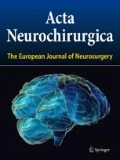To the editor:
We thank Zheng et al. for their interest in our meta-analysis of perioperative and long-term outcomes in patients receiving statin therapy before carotid endarterectomy, and their comments regarding the profound academic importance of the study [5]. We agree with Zheng et al. that there may be some degree of heterogeneity (I2 = 53%; P > 0.06) found in our meta-analysis of perioperative stroke events, as highlighted in our limitations. However, heterogeneity, when detected using the chi-squared (χ2) and I2 test statistics, is considered to be present when both the χ2 value is within 5% level of significance p < 0.050 and the I2 value exceeds 33% [4]. In the meta-analysis of perioperative stroke events, heterogeneity was detected with the I2 test. However, the χ2 test did not reveal significant heterogeneity. Therefore, conclusions by Zheng et al. in regard to the presence of considerable heterogeneity and lack of reliability in the pooled results may be over-stated.
In the meta-analysis of perioperative stroke events, random effects models were utilized. This is a well-established and appropriate statistical method for pooling heterogeneous results [1, 2]. Zheng et al. have attempted to address the presence of heterogeneity by performing an additional sensitivity analysis. The authors describe the removal of a single study from the pooled results but do not provide a rationale for the study selection. The Cochrane handbook, which the authors have referenced, details the methodology for a sensitivity analysis [3]. However, it does not provide evidence to suggest that heterogeneity adjustment is an appropriate indication for its use [3]. Therefore, we do not consider the sensitivity analysis by Zheng et al. to provide additional value to the results of our study.
In light of the heterogeneity present among the included studies, the meta-analysis should be interpreted with caution. The results have suggested that administration of statin therapy before carotid endarterectomy is associated with lower rates of perioperative stroke. Therefore, future investigation to characterize the degree and nature of the potential benefit of statin therapy on perioperative outcomes among patients undergoing carotid endarterectomy for internal carotid artery stenosis is warranted.
References
DerSimonian R, Laird N (1986) Meta-analysis in clinical trials. Control Clin Trials 7:177–188
Hardy RJ, Thompson SG (1996) A likelihood approach to meta-analysis with random effects. Stat Med 15:619–629. https://doi.org/10.1002/(sici)1097-0258(19960330)15:6<619::Aid-sim188>3.0.Co;2-a
Higgins JP, Green S (2011) Cochrane handbook for systematic reviews of interventions version 5.1.0. The Cochrane Collaboration. Available from www.handbook.cochrane.org. Accessed 30 Dec 2018
Higgins JP, Thompson SG (2002) Quantifying heterogeneity in a meta-analysis. Stat Med 21:1539–1558. https://doi.org/10.1002/sim.1186
Zheng F LM, Ye Liping, Liao Xiangping, Xiao Mengran, Zhang Ziliang, Zou Liansheng, Yang Shaochun (2019) Statin use in patients undergoing carotid artery endarterectomy: still much to be uncovered. Acta Neurochir. https://doi.org/10.1007/s00701-019-03802-x
Author information
Authors and Affiliations
Corresponding author
Ethics declarations
Conflict of interest
The authors declare that they have no conflict of interest.
Additional information
Publisher’s note
Springer Nature remains neutral with regard to jurisdictional claims in published maps and institutional affiliations.
This article is part of the Topical Collection on Vascular Neurosurgery – Other
Rights and permissions
About this article
Cite this article
Ironside, N., Brenner, D., Heyer, E. et al. In response to letter to the editor “Statin use in patients undergoing carotid artery endarterectomy: still much to be uncovered”. Acta Neurochir 161, 415 (2019). https://doi.org/10.1007/s00701-019-03803-w
Received:
Accepted:
Published:
Issue Date:
DOI: https://doi.org/10.1007/s00701-019-03803-w

